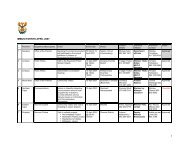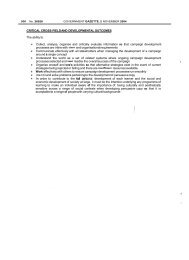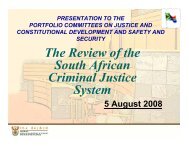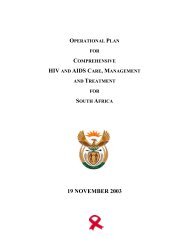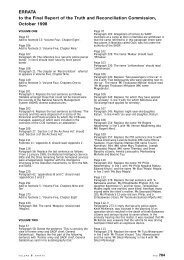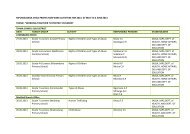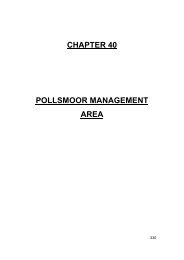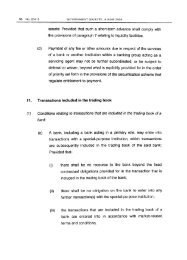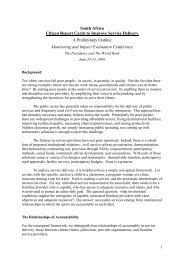National Guiding Principles and Standards for M&E of Public Sector ...
National Guiding Principles and Standards for M&E of Public Sector ...
National Guiding Principles and Standards for M&E of Public Sector ...
You also want an ePaper? Increase the reach of your titles
YUMPU automatically turns print PDFs into web optimized ePapers that Google loves.
<strong>National</strong> <strong>Guiding</strong> <strong>Principles</strong> <strong>and</strong><br />
St<strong>and</strong>ards <strong>for</strong> M&E <strong>of</strong> <strong>Public</strong><br />
<strong>Sector</strong> Policies & Programmes<br />
in South Africa<br />
Monitoring & Impact Assessment Seminar<br />
19-23 June 2006<br />
The Farm Inn, Pretoria<br />
RSA<br />
By Pr<strong>of</strong> Levin, DG DPSA
Contents<br />
<br />
<br />
<br />
<br />
<br />
<br />
<br />
<br />
Introduction<br />
Background<br />
Objective<br />
Constitutional/ Legislative Requirements<br />
Rationale<br />
Documenting <strong>Guiding</strong> <strong>Principles</strong> & St<strong>and</strong>ards<br />
Summary<br />
Recommendations
Introduction<br />
<br />
At its 2004 May lekgotla, Cabinet <strong>for</strong>mally adopted a<br />
resolution in support <strong>of</strong> the development framework,<br />
subsequent to this resolution, the President, in his State <strong>of</strong><br />
the Nation Address further emphasised <strong>and</strong> entrenched<br />
the importance <strong>of</strong> monitoring, evaluation <strong>and</strong> reporting <strong>for</strong><br />
government. The Governance <strong>and</strong> Administration (G&A)<br />
Cluster was m<strong>and</strong>ated with the overall responsibility <strong>of</strong><br />
designing <strong>and</strong> implementing a government wide Monitoring<br />
<strong>and</strong> Evaluation Framework.
Background<br />
<br />
<br />
The South African Government has over the past ten<br />
years recognised the challenges arising from having<br />
to trans<strong>for</strong>m the state into a developmental one while<br />
simultaneously trying to deliver <strong>and</strong> redress the<br />
legacy <strong>of</strong> the past social imbalances.<br />
To ensure that tangible results are achieved, there is<br />
an increasing recognition <strong>of</strong> the attendant <strong>and</strong> urgent<br />
need <strong>for</strong> greater effectiveness in the way that<br />
government monitors, evaluates <strong>and</strong> reports on its<br />
policies, projects <strong>and</strong> programmes
Background (cont)<br />
<br />
To realise the creation <strong>of</strong> such a Framework, the G&A<br />
Cluster has established a special Monitoring <strong>and</strong><br />
Evaluation Task team to oversee this task. As part <strong>of</strong><br />
its programme <strong>of</strong> action, the M&E Task Team has<br />
identified a range <strong>of</strong> activities that need to be<br />
undertaken, one such activity includes the<br />
development <strong>of</strong> principles <strong>and</strong> st<strong>and</strong>ards <strong>for</strong><br />
monitoring <strong>of</strong> government policies, programmes <strong>and</strong><br />
projects
Rationale<br />
<br />
These principles were developed in the<br />
context <strong>of</strong> African cultures, particularly South<br />
Africa, <strong>and</strong> reflect the experiences <strong>of</strong> that<br />
context. The relevance <strong>of</strong> these principles may<br />
vary across other cultures, <strong>and</strong> across<br />
subcultures within the African continent
Purpose <strong>of</strong> M&E <strong>Principles</strong><br />
& St<strong>and</strong>ards<br />
<br />
The document sets out the national M&E principles<br />
<strong>and</strong> practices, including minimum norms <strong>and</strong><br />
st<strong>and</strong>ards <strong>for</strong> monitoring <strong>and</strong> evaluating government<br />
policies, projects <strong>and</strong> programmes.<br />
<br />
It also focuses on procedures to be adopted by<br />
national, provincial, local <strong>and</strong> public entities in the<br />
monitoring <strong>and</strong> evaluation <strong>of</strong> implementation <strong>of</strong><br />
government policies <strong>and</strong> programmes/projects
Documenting M&E<br />
<strong>Principles</strong> & St<strong>and</strong>ards<br />
<br />
<br />
The purpose <strong>of</strong> documenting guiding principles is<br />
to foster continuing development <strong>of</strong> the pr<strong>of</strong>ession<br />
<strong>of</strong> monitoring <strong>of</strong> evaluation/ impact assessment,<br />
<strong>and</strong> the socialization <strong>of</strong> its members.<br />
The principles are meant to stimulate discussion<br />
about the proper practice <strong>and</strong> use <strong>of</strong> M&E among<br />
members <strong>of</strong> the pr<strong>of</strong>ession, sponsors <strong>of</strong><br />
evaluation, <strong>and</strong> others interested in Monitoring &<br />
Impact Assessment
Constitutional / Legislative<br />
Requirement <strong>for</strong> M&E<br />
<br />
<br />
<br />
<br />
Basic values <strong>and</strong> principles governing public administration<br />
are enshrined in the Constitution <strong>of</strong> South Africa, Act 108 <strong>of</strong><br />
1996, Chapter 10 <strong>and</strong> includes the following principles:<br />
Accountability <strong>of</strong> <strong>Public</strong> administration<br />
Transparency to the public fostered through provision <strong>of</strong><br />
timely, accessible <strong>and</strong> accurate in<strong>for</strong>mation<br />
These principles apply to administration in every sphere <strong>of</strong><br />
government; organs <strong>of</strong> state <strong>and</strong> public enterprises.
Constitutional / Legislative<br />
Requirement <strong>for</strong> M&E (Cont)<br />
The constitution also sets out the grounds on which<br />
independent bodies such as the <strong>Public</strong> Service Commission<br />
must ensure effective <strong>and</strong> efficient per<strong>for</strong>mance within the<br />
public sector. The Constitution does not preclude other nongovernmental<br />
bodies to per<strong>for</strong>m monitoring <strong>and</strong> evaluation<br />
function. Many government Acts <strong>and</strong> policies empowers<br />
Ministers <strong>of</strong> different departments to determine norms <strong>and</strong><br />
minimum st<strong>and</strong>ards <strong>for</strong> monitoring <strong>and</strong> evaluation <strong>of</strong> their<br />
own programmes <strong>and</strong> projects. Provinces also determine<br />
own norms based on national guidelines. These principles<br />
there<strong>for</strong>e underlie the national minimum st<strong>and</strong>ards <strong>for</strong><br />
Monitoring <strong>and</strong> Evaluation <strong>for</strong> which various Ministries are<br />
required to determine frameworks related there<strong>of</strong>
Institutional Areas<br />
<strong>of</strong> Coverage<br />
<br />
To ensure full coverage <strong>of</strong> the public service, the<br />
document recognises that at one level, there are<br />
practices <strong>and</strong> systems that are government wide <strong>and</strong>,<br />
at another level, there are systems <strong>and</strong> practices that<br />
are particular to provinces, sectors, departments<br />
<strong>and</strong>/or clusters. The document ensures that the<br />
institutional map serves to cover all <strong>of</strong> the institutional<br />
terrains within which M & E practices <strong>and</strong> systems are<br />
established
Monitoring & Evaluation<br />
Coverage<br />
<br />
Monitoring & Evaluation, including systematic<br />
reporting must be undertaken <strong>for</strong> all<br />
programmes <strong>and</strong> projects regardless <strong>of</strong> duration<br />
<strong>and</strong> budget
St<strong>and</strong>ards:<br />
1…as guide to pr<strong>of</strong>essional practice<br />
<br />
The principles are intended to guide the pr<strong>of</strong>essional<br />
practice <strong>of</strong> M&E practitioners, <strong>and</strong> to in<strong>for</strong>m clients <strong>and</strong><br />
the general public about the principles they can expect<br />
to be upheld by pr<strong>of</strong>essional M&E practitioners. Of<br />
course, no statement <strong>of</strong> principles can anticipate all<br />
situations that arise in the practice <strong>of</strong> monitoring &<br />
evaluation. However, principles are not just guidelines<br />
<strong>for</strong> reaction when something goes wrong or when a<br />
dilemma is found. Rather, principles should proactively<br />
guide the behaviours <strong>of</strong> pr<strong>of</strong>essionals in everyday<br />
practice
2…as a matter <strong>of</strong> choice<br />
<br />
The six principles proposed in the document are not<br />
independent, but overlap in many ways. Conversely,<br />
sometimes these principles will conflict, so that<br />
evaluators will have to choose among them. At such<br />
times evaluators must use their own values <strong>and</strong><br />
knowledge <strong>of</strong> the setting to determine the appropriate<br />
response. Whenever a course <strong>of</strong> action is unclear,<br />
evaluators should solicit the advice <strong>of</strong> fellow evaluators<br />
about how to resolve the problem be<strong>for</strong>e deciding how<br />
to proceed.
3…as <strong>of</strong>ficial government<br />
position<br />
<br />
<br />
These principles are not intended to supersede any<br />
previous work on st<strong>and</strong>ards, principles, or ethics adopted<br />
by other organizations, such as Evaluation Research<br />
Societies <strong>and</strong> the Evaluation Networks.<br />
These principles will be adopted as the <strong>of</strong>ficial position <strong>of</strong><br />
government <strong>of</strong> RSA on these matters
4…nor replacement<br />
<br />
These principles are not intended to replace<br />
st<strong>and</strong>ards supported by evaluators or by the other<br />
disciplines in which evaluators participate
5…not rules to provide basis <strong>for</strong><br />
sanctioning violators<br />
<br />
Each principle is illustrated by a number <strong>of</strong> statements<br />
to amplify the meaning <strong>of</strong> the overarching principle, <strong>and</strong><br />
to provide guidance <strong>for</strong> its application. These<br />
illustrations are not meant to include all possible<br />
applications <strong>of</strong> that principle, nor to be viewed as rules<br />
that provide the basis <strong>for</strong> sanctioning violators
6…as part <strong>of</strong> evolving process <strong>of</strong><br />
self examination<br />
<br />
<br />
<br />
These principles are part <strong>of</strong> an evolving process <strong>of</strong> selfexamination<br />
by the pr<strong>of</strong>ession, <strong>and</strong> should be revisited<br />
on a regular basis;<br />
Mechanisms might include <strong>of</strong>ficially-sponsored reviews<br />
<strong>of</strong> principles at annual meetings, <strong>and</strong> other <strong>for</strong>ums <strong>for</strong><br />
harvesting experience with the principles <strong>and</strong> their<br />
application. On a regular basis, but at least every five<br />
years, these principles ought to be examined <strong>for</strong><br />
possible review <strong>and</strong> revision;<br />
In order to maintain government-wide awareness <strong>and</strong><br />
relevance, all relevant stakeholders are encouraged to<br />
participate in this process
7…as a first milestone in SA’s<br />
debate<br />
<br />
<br />
As a first milestone in South Africa’s debate, the guiding<br />
principles will be confronted by members with their own<br />
M&E practices with a view to further development;<br />
All stakeholders will be invited to apply this reference<br />
text to documents adapted to their specific needs,<br />
particularly in the area <strong>of</strong> quality monitoring <strong>and</strong><br />
evaluation st<strong>and</strong>ards
Summary: <strong>Guiding</strong> <strong>Principles</strong> <strong>for</strong><br />
Evaluation/ Impact Assessment<br />
<br />
<br />
Stakeholder Identification--Persons involved in or<br />
affected by the evaluation should be identified, so that<br />
their needs can be addressed;<br />
Evaluator Credibility--The persons conducting the<br />
evaluation should be both trustworthy <strong>and</strong> competent<br />
to per<strong>for</strong>m the evaluation, so that the evaluation<br />
findings achieve maximum credibility <strong>and</strong> acceptance;
Summary: <strong>Guiding</strong> <strong>Principles</strong> <strong>for</strong><br />
Evaluation/ Impact Assessment (cont)<br />
<br />
<br />
In<strong>for</strong>mation Scope <strong>and</strong> Selection--In<strong>for</strong>mation<br />
collected should be broadly selected to address<br />
pertinent questions about the programme <strong>and</strong> be<br />
responsive to the needs <strong>and</strong> interests <strong>of</strong> clients <strong>and</strong><br />
other specified stakeholders;<br />
Values Identification--The perspectives, procedures,<br />
<strong>and</strong> rationale used to interpret the findings should be<br />
carefully described, so that the bases <strong>for</strong> value<br />
judgments are clear;
<strong>Guiding</strong> <strong>Principles</strong> <strong>for</strong> Evaluation/<br />
Impact Assessment (cont)<br />
Report Clarity--Evaluation reports should clearly describe<br />
the programme being evaluated, including its context, <strong>and</strong><br />
the purposes, procedures, <strong>and</strong> findings <strong>of</strong> the evaluation, so<br />
that essential in<strong>for</strong>mation is provided <strong>and</strong> easily understood;<br />
Report Timeliness <strong>and</strong> Dissemination--Significant interim<br />
findings <strong>and</strong> evaluation reports should be disseminated to<br />
intended users, so that they can be used in a timely fashion;<br />
Evaluation Impact--Evaluations should be planned,<br />
conducted, <strong>and</strong> reported in ways that encourage followthrough<br />
by stakeholders, so that the likelihood that the<br />
evaluation will be used is increased.
Feasibility <strong>Principles</strong><br />
<br />
<br />
Feasibility <strong>Principles</strong> The feasibility principles are<br />
intended to ensure that an evaluation will be realistic,<br />
prudent, diplomatic, <strong>and</strong> frugal;<br />
Practical Procedures--The evaluation procedures<br />
should be practical, to keep disruption to a minimum<br />
while needed in<strong>for</strong>mation is obtained
Feasibility <strong>Principles</strong><br />
<br />
<br />
Political Viability--The evaluation should be planned<br />
<strong>and</strong> conducted with anticipation <strong>of</strong> the different positions<br />
<strong>of</strong> various interest groups, so that their cooperation may<br />
be obtained, <strong>and</strong> so that possible attempts by any <strong>of</strong><br />
these groups to curtail evaluation operations or to bias<br />
or misapply the results can be averted or counteracted;<br />
Cost Effectiveness--The evaluation should be efficient<br />
<strong>and</strong> produce in<strong>for</strong>mation <strong>of</strong> sufficient value, so that the<br />
resources expended can be justified
Propriety <strong>Principles</strong><br />
<br />
<br />
<br />
The propriety st<strong>and</strong>ards are intended to ensure that an<br />
evaluation will be conducted legally, ethically, <strong>and</strong> with<br />
due regard <strong>for</strong> the welfare <strong>of</strong> those involved in the<br />
evaluation, as well as those affected by its results;<br />
Service Orientation--Evaluations should be designed to<br />
assist organizations to address <strong>and</strong> effectively serve the<br />
needs <strong>of</strong> the full range <strong>of</strong> targeted participants;<br />
Formal Agreements--Obligations <strong>of</strong> the <strong>for</strong>mal parties to<br />
an evaluation (what is to be done, how, by whom, when)<br />
should be agreed to in writing, so that these parties are<br />
obligated to adhere to all conditions <strong>of</strong> the agreement or<br />
<strong>for</strong>mally to renegotiate it;
Propriety <strong>Principles</strong><br />
<br />
<br />
Rights <strong>of</strong> Human Subjects--Evaluations should be<br />
designed <strong>and</strong> conducted to respect <strong>and</strong> protect the rights<br />
<strong>and</strong> welfare <strong>of</strong> human subjects;<br />
Human Interactions--Evaluators should respect human<br />
dignity <strong>and</strong> worth in their interactions with other persons<br />
associated with an evaluation, so that participants are not<br />
threatened or harmed.
Propriety <strong>Principles</strong> (cont)<br />
<br />
<br />
Complete <strong>and</strong> Fair Assessment--The evaluation<br />
should be complete <strong>and</strong> fair in its examination <strong>and</strong><br />
recording <strong>of</strong> strengths <strong>and</strong> weaknesses <strong>of</strong> the program<br />
being evaluated, so that strengths can be built upon<br />
<strong>and</strong> problem areas addressed;<br />
Disclosure <strong>of</strong> Findings--The <strong>for</strong>mal parties to an<br />
evaluation should ensure that the full set <strong>of</strong> evaluation<br />
findings along with pertinent limitations are made<br />
accessible to the persons affected by the evaluation,<br />
<strong>and</strong> any others with expressed legal rights to receive<br />
the results;
Propriety <strong>Principles</strong> (cont)<br />
<br />
<br />
Conflict <strong>of</strong> Interest--Conflict <strong>of</strong> interest should be dealt<br />
with openly <strong>and</strong> honestly, so that it does not compromise<br />
the evaluation processes <strong>and</strong> results;<br />
Fiscal Responsibility--The evaluator's allocation <strong>and</strong><br />
expenditure <strong>of</strong> resources should reflect sound<br />
accountability procedures <strong>and</strong> otherwise be prudent <strong>and</strong><br />
ethically responsible, so that expenditures are accounted<br />
<strong>for</strong> <strong>and</strong> appropriate.
Accuracy St<strong>and</strong>ards<br />
<br />
<br />
<br />
The accuracy st<strong>and</strong>ards are intended to ensure that an<br />
evaluation will reveal <strong>and</strong> convey technically adequate<br />
in<strong>for</strong>mation about the features that determine worth or<br />
merit <strong>of</strong> the programme being evaluated.<br />
Program Documentation--The program being<br />
evaluated should be described <strong>and</strong> documented clearly<br />
<strong>and</strong> accurately, so that the program is clearly identified;<br />
Context Analysis--The context in which the programme<br />
exists should be examined in enough detail, so that its<br />
likely influences on the program can be identified;
Accuracy St<strong>and</strong>ards (cont)<br />
<br />
<br />
<br />
Described Purposes <strong>and</strong> Procedures--The purposes<br />
<strong>and</strong> procedures <strong>of</strong> the evaluation should be monitored<br />
<strong>and</strong> described in enough detail, so that they can be<br />
identified <strong>and</strong> assessed;<br />
Defensible In<strong>for</strong>mation Sources--The sources <strong>of</strong><br />
in<strong>for</strong>mation used in a program evaluation should be<br />
described in enough detail, so that the adequacy <strong>of</strong> the<br />
in<strong>for</strong>mation can be assessed;<br />
Valid In<strong>for</strong>mation--The in<strong>for</strong>mation gathering procedures<br />
should be chosen or developed <strong>and</strong> then implemented so<br />
that they will assure that the interpretation arrived at is<br />
valid <strong>for</strong> the intended use.
Accuracy St<strong>and</strong>ards (cont)<br />
<br />
<br />
<br />
Reliable In<strong>for</strong>mation--The in<strong>for</strong>mation gathering<br />
procedures should be chosen or developed <strong>and</strong> then<br />
implemented so that they will assure that the in<strong>for</strong>mation<br />
obtained is sufficiently reliable <strong>for</strong> the intended use.<br />
Systematic In<strong>for</strong>mation--The in<strong>for</strong>mation collected,<br />
processed, <strong>and</strong> reported in an evaluation should be<br />
systematically reviewed <strong>and</strong> any errors found should be<br />
corrected.<br />
Analysis <strong>of</strong> Quantitative In<strong>for</strong>mation--Quantitative<br />
in<strong>for</strong>mation in an evaluation should be appropriately <strong>and</strong><br />
systematically analyzed so that evaluation questions are<br />
effectively answered.
Accuracy St<strong>and</strong>ards (cont)<br />
<br />
<br />
<br />
Analysis <strong>of</strong> Qualitative In<strong>for</strong>mation--Qualitative<br />
in<strong>for</strong>mation in an evaluation should be appropriately<br />
<strong>and</strong> systematically analyzed so that evaluation<br />
questions are effectively answered.<br />
Justified Conclusions--The conclusions reached in an<br />
evaluation should be explicitly justified, so that<br />
stakeholders can assess them.<br />
Impartial Reporting--Reporting procedures should<br />
guard against distortion caused by personal feelings<br />
<strong>and</strong> biases <strong>of</strong> any party to the evaluation, so that<br />
evaluation reports fairly reflect the evaluation findings
Recommendations<br />
It is recommended that the Conference<br />
<br />
<br />
<br />
<br />
<br />
Note the content <strong>of</strong> the document titled : “Monitoring &<br />
Evaluation <strong>Principles</strong> <strong>and</strong> St<strong>and</strong>ards <strong>for</strong> South Africa<br />
(attached on cd provided)<br />
Input from this conference be incorporated into the<br />
document;<br />
Document be submitted to Cabinet <strong>for</strong> consideration;<br />
Upon approval by Cabinet, there should be ongoing<br />
review by all stakeholders<br />
Regulations be developed



